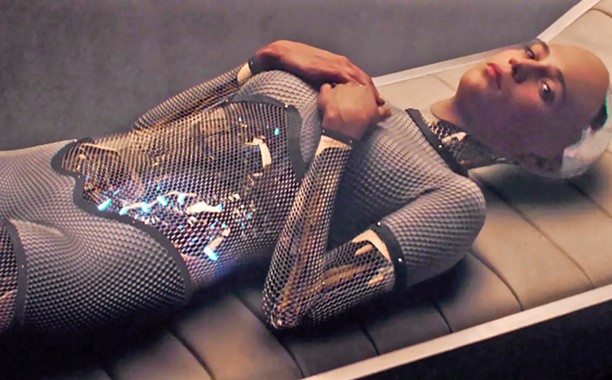6. Predictability

A human being can often anticipate something if he or she follows the logical sequences in a movie or a literary work, but a problem arises when the scene in the movie is designed to shock, but can easily be predicted.
The music in the film often highlights what is designed to stun, but when it fails to do that, the viewer is frustrated or even offended. Some plot twists can be predicted with the usage of common sense; hypothetic-deductive reasoning is not necessary.
The biggest problem lies in the predictability of plot twists that are crucial for the development of the narration. Consequently, the film as a whole can be a disappointment.
7. Characterization of characters

Ava seems to be the only character that has a clear motivation, complexity, and intelligence to achieve what she wants. The portrayals of Ava, Nathan, and Caleb can be explained in terms of a philosophy of human condition that sees men as “weak” and AI’s the future of the world (this only seems logical), but that is an extremely pessimistic worldview.
The other explanation is that the male characters in the movie are meant to seem intelligent and humanlike, but in the end they seem underdeveloped and juvenile at times. Nathan, for instance, is morally one-dimensional.
The viewer might expect a twist, considering his role in the film, but it does not happen. He remains the same throughout the movie, an impulsive and manipulative character who ends up being manipulated by others.
The viewer is right to expect more from a character who at the age of 13 managed to be an extremely successful programmer. His character is underdeveloped mostly because the impression of him is influenced by both signs of intelligence and crudeness; the viewer cannot exactly “pinpoint” his character traits.
8. Character motivation

The viewer does not find out why exactly Nathan created Ava and the prototypes; it is mentioned only that it was “inevitable”. We do not know why he wanted to make AI; how did he envision the future, and to what ends will it serve humanity or even be its part?
The “god complex” motivation is too “weak” to be the sole motivation, and it explains something about Nathan’s psyche, but broader implications are not mentioned.
Caleb’s motivation behind questioning Ava is convincing as exhilaration and curiosity, but the same could not be said about Nathan, who is the creator of the AI. He seems almost indifferent, as if he created a new dish and not an invention that is a groundbreaking point in the development of humanity.
This could be attributed to his alcoholism and nihilistic worldviews, but passive nihilism is rarely a worldview of people who change the world with their tour de force. There is only one Arthur Schopenhauer.
9. Emphasis on sex

Sex has not been a taboo in Western art and societies for decades (in film history, Bergman’s “Silence” is an interesting document on the subject), but the strong emphasis on sexuality in the film, via dialogues and images, moves the focus from subjects that should be at the center of any sci-fi film that deals with such important theme like AI. There is no sign of the sublimation of sexuality in the movie; what we see is a crude manifestation of desires that are running havoc.
The main problem with the objectification of female characters, that is expressed vividly in the fact that AI are objects of sexual desire, is that it is used as a tool that tells little and at the end of the day, does not give the viewer an impression that what he saw is sublime in any way; just a nihilistic portrayal of crudeness.
10. Lack of authentic emotions

Although one could say that the movie portrays a wide range of emotions, and in a way it does, the characters are not presented in a way that could truly move the viewer and provoke care for their well being.
All the aspects of the movie that were mentioned explain why the film lacks authentic emotions and fails to present what it aspires to and invoke feelings on a higher level of emotional involvement. Although the visuals are memorable, that is simply not enough to make a lasting impact.
“Ex Machina” will go down in the history of film reminiscent of a painting of intense colors with an unimpressive message, lacking crucial elements that make up a masterpiece.
Author Bio: Hrvoje Galich is a student of political science and writes expressionist poetry. He believes that Tristan und Isolde is the most beautiful artistic piece in the history of man. He loves movies by Andrei Tarkovsky, Michelangelo Antonioni, Ingmar Bergman and Shohei Imamura. He adores his cat “Meow”, the only cat in the world that can say her name.